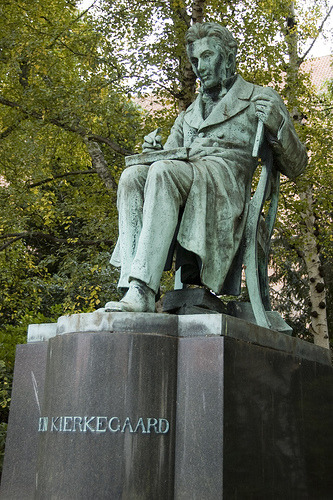Related:
Below is an excerpt from, "The Soul of Kierkegaard: Selections from His Journals." Edited by Alexander Dru. Dover Publications, Inc: Mineola, New York. 2003. Pg. 140-42.
It is wonderful how God's love overwhelms me---alas, ultimately I know of no truer prayer than what I pray over and over again, that God will allow me and not be angry with me because I continuously thank him for having done and for doing, yes, and for doing so indescribably much more for me than I ever expected. Surrounded by scorn, pestered day in and day out by the pettiness of men, even of those nearest to me, I know of nothing either at home or in my inmost self than to thank and thank God; for I understand that what he has done for me is indescribable. A man---and what is a man before God, nothing, less than nothing; and what is more a poor man who from childhood up has fallen into the most wretched melancholy, an object of dread to himself: and then God helps me and grants me what he has granted me! A life which was a burden to me however much I may at times have understood all its fortunate aspects, but which was all embittered for me by the dark spot which ruined all; and as I understood, if other men knew the secret of my life, I should from the very beginning have been the object of their pity and sympathy, a burden to myself: God takes charge of such lives. He lets me weep before him in silent solitude, pour forth and again pour forth my pain, with the blessed consolation of knowing that he is concerned for me---and in the meanwhile he gives that life of pain a significance which almost overwhelms me, gives me good fortune and strength and wisdom for my whole undertaking, in making my life the pure expression of ideas, or he makes it into that.For I now see so clearly (once again in renewed joy to God, a new occasion of thanks) that my life is so arranged. My life began without immediateness, with a terrible melancholy, in its earliest youth deranged in its very deepest foundations, a melancholy which threw me for a time into sin and debauchery and yet (humanly speaking) almost more insane than guilty. Thus my father's death really pulled me up. I dared not believe that the fundamental misfortune of my being could be resolved: and so I grasped eternity with the blessed assurance that God is love, even though I was to suffer thus all my life; yes, with that blessed assurance. This is how I looked upon my life. Then once again and sympathetically, I was flung down into the abyss of melancholy by having to break off my engagement and why, simply because I dared not believe that God would resolve the fundamental misfortune of my being, take away my almost insane melancholy, which I now desired, for her sake and then again for mine, with all the passion of my soul. It was as difficult as possible to have to reproduce my own misery. Once again I was resigned. Thinking only of working to free her I went to meet a life of this kind but, God be praised, always certain and with the blessed assurance that God is love, nothing has been more certain to me.And now, now that in many ways I have been brought to the last extremity, now (since last Easter, though with intervals) a hope has awakened in my soul that God may desire to resolve the fundamental misery of my being. That is to say, now I am in faith in the profoundest sense. Faith is immediacy after reflection. As poet and thinker I have represented all things in the medium of the imagination, myself living in resignation. Now life comes closer to me, or I am closer to myself, coming to myself.===To God all things are possible, that thought is now, in the deepest sense, my watch-word, has acquired a significance in my eyes which I had never imagined it could have. That I must never, at any moment, presume to say that there is no way out for God because I cannot see any. For it is despair and presumption to confuse one's pittance of imagination with the possibility over which God disposes.
